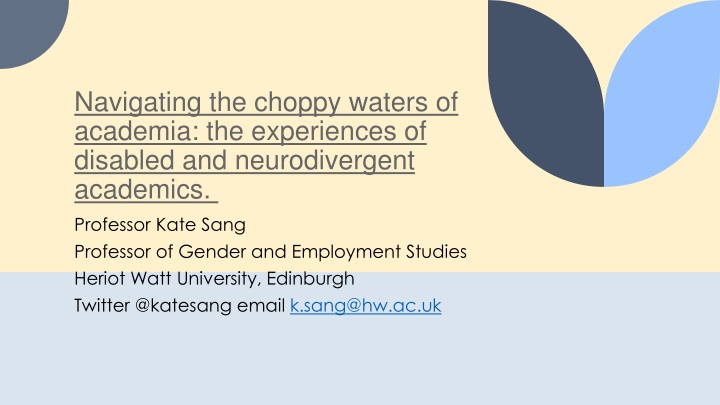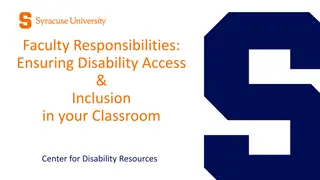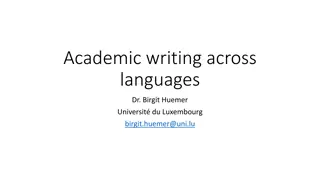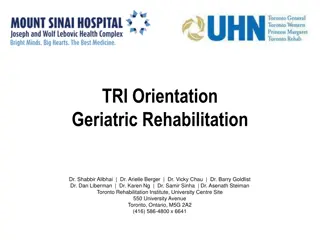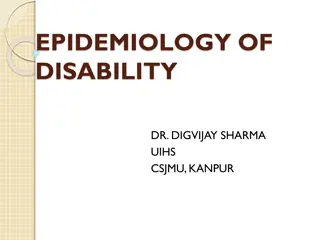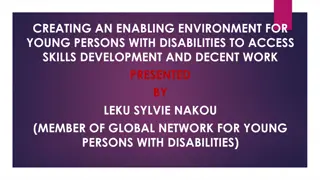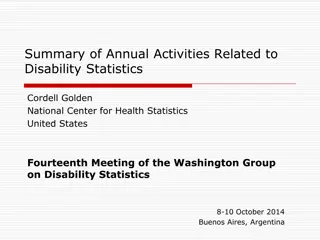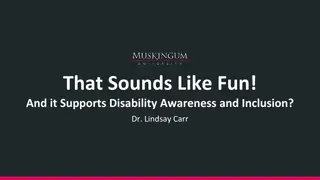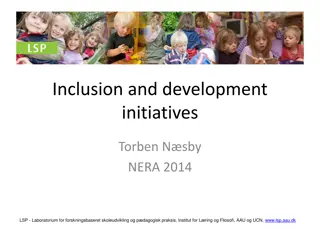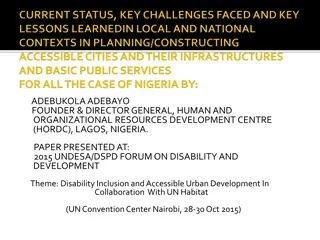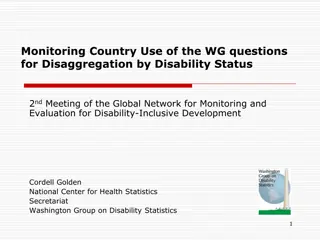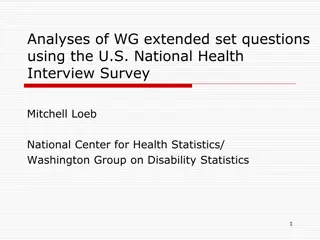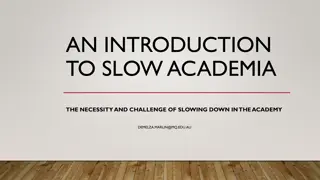Navigating the Challenges of Disability Inclusion in Academia
Professor Kate Sang discusses the experiences of disabled and neurodivergent academics, highlighting the importance of disability inclusion in universities. The talk covers theoretical frameworks, empirical studies, key themes, and challenges faced by the audience. The research team and various studies focusing on disability in academic settings are also presented.
Download Presentation

Please find below an Image/Link to download the presentation.
The content on the website is provided AS IS for your information and personal use only. It may not be sold, licensed, or shared on other websites without obtaining consent from the author.If you encounter any issues during the download, it is possible that the publisher has removed the file from their server.
You are allowed to download the files provided on this website for personal or commercial use, subject to the condition that they are used lawfully. All files are the property of their respective owners.
The content on the website is provided AS IS for your information and personal use only. It may not be sold, licensed, or shared on other websites without obtaining consent from the author.
E N D
Presentation Transcript
Navigating the choppy waters of academia: the experiences of disabled and neurodivergent academics. Professor Kate Sang Professor of Gender and Employment Studies Heriot Watt University, Edinburgh Twitter @katesang email k.sang@hw.ac.uk
Outline of talk Disability inclusion in universities Theoretical underpinning social relational model of disability Empirical studies Key themes Challenges to the audience Q&A EDICa 2
The wider research team Dr Jennifer Remnant Dr Cat Morgan Dr Lena Wanggren Dr Clayton Magill Dr David Woolf Professor Teresa Fernandes Mrs Fenella Watson Dr Thomas Calvard Dr Katriona Myhill Dr James Richards Abraham Babajide Mrs Chiara Cocco Dr Frederick Bosche Professor Garry Pender Dr Sara Shinton 3
Disability inclusion in universities Student focus (Equality Act, 2010) - staff 'cliff edge' Gender (in)equality well-established (and stubborn) Very low disclosure rate (neoliberal university, marketisation and managerialism) Low representation in senior positions Othered in universities
Theoretical underpinning The social relational model of disability Carol Thomas. Disability does not reside within an individual. Medical model (disability resides in the individual, and needs to be resolved or removed) Social model (impairment is distinct from disability, which is social oppression that occurs as a result of interacting with an ableist world) Social relational model (disability and impairment are distinct, disability is social oppression rooted in unequal social relationships. Impairment effects) We are disabled by working in ableist and neurotypical workplaces. Identify and remove disabling barriers Disabled person not person with a disability.
Studies EPSRC & Heriot Watt funded career acceleration grant in 2017 experiences of disabled academics Survey menstruation, gynaecological health and menopause in university careers Heriot Watt funded research 2019 lived experiences of gynaecological health in UK academia EPSRC funded Inclusion Matters project 2019-2021 NERC Enabling Neurodiverse Inclusive Science Careers 2022 Equality, Diversity and Inclusion Caucus 2023 onwards
Key themes - academics Performance management Career progression Internalised ableism Distrust of HR Ill-informed line management Stigma/shame Incompatibility of the body with an academic career Disciplinary differences Intersectionality
Alex - PGR Alex is gender non-binary. They experience endometriosis, heavy periods, a respiratory condition and have been diagnosed with mental health issues. They have also been diagnosed with autism but do not consider that diagnosis a disability. They often use a wheelchair. They are completing a PhD in Geosciences. Alex s colleagues know that they are disabled, and they have disclosed their mental health issues to their line manager. During their PhD they took a substantial leave of absence and have formal agreement in place to complete their PhD part time. They have informal arrangements with their line manager regarding their use of the lab and flexible hours. To enter the workplace, Alex passes through an area where people congregate to smoke causing them discomfort. The lift in their workplace is regularly out of service. They work in an open plan office, which makes them uncomfortable as they like to be able to see who is coming and going. They also work in a lab that requires specific cleanliness conditions. Conferences are often inaccessible to Alex, as are their institution s teaching rooms, meaning they can t teach. 8
Management of problematic menstruation - blood 'IT WAS LITERALLY SIT ON A PLASTIC BAG ON THE SEAT OF THE CAR. TWO LONG PADS, A SUPER PLUS TAMPON AND A CHANGE OF CLOTHES IN THE BOOT.' WHEN I FIRST STARTED GOING [HERE] I DIDN T KNOW THE UNIVERSITY ONE OF THE FIRST THOUGHT WAS OKAY, I VE GOT A MEETING IN THIS BUILDING BUT WHERE S THE NEAREST TOILET? BECAUSE YOU HAVE TO BE AND MEN DON T HAVE TO THINK LIKE THAT, IN THE SAME WAY. AND IT S JUST, IT JUST MADE ME KIND OF A BIT, DO YOU KNOW, YOU RE ALWAYS AWARE OF IT WHEN YOU VE GOT HEAVY PERIODS AND IT S AN ISSUE. ESPECIALLY WHEN YOU RE SHARING A TOILET WITH PEOPLE OF AN OPPOSITE [SEX]. AT THAT TIME WE WORKED IN KIND OF LIKE A TENEMENT BUILDING. SO ONE OF THE TOILETS, THERE WAS ONE MAN ON THE FLOOR AND HE USED THE SAME TOILET SO WE WERE ALWAYS KIND OF CONSCIOUS THAT, YOU KNOW, THERE WAS MAN COMING IN. THEY MIGHT HEAR YOU CLICK THE PEDAL BIN AS YOU RE DISPOSING OF THINGS. 9
Gynaecological health wider findings Miscarriage at work Male dominated workplaces Activism Fear of students knowing(odour) 10
Key themes university management and processes Managers/HR/UCU reps Policy Disabled people sick/underperforming Policies unhelpful Distrust (is this a 'real' disability) Poor understanding of disability Medical validation Medical model of disability Disabled people a problem Positioned as under-performing Individualised adjustments requiring medical certification HR universally distrusted by disabled academics, line managers and union reps 11
Hazel HR director Elizabeth is a senior HR advisor who has worked in HE for over ten years. She explained how across universities, less academics disclose being disabled or having a long term condition than professional services staff. She explained that university policies relating to disability are due to be reviewed, but said it wasn t a priority because other policies were more out of date. The relevant policies included absence management, capability and performance management. For Elizabeth it is important to treat everyone the same, and not identify anyone as special . To explain her point, she pointed out that people in the Deaf community do not consider themselves disabled. 12
Disability in UK universities the social relational approach Across the 4 studies the data shows that Academics with 'impairments' are positioned as a problem/not the ideal academic disabled by attitudes, policy, ableism, built environment, performance expectations Internalised ableism amongst academics Neoliberal discourses of performance management other academics with impairments Impairment effects (neglected) 'I'm not disabled until I leave my home'
Challenges to the audience Move away from person first language & no euphemisms! Move focus to changing oppressive and disabling workplaces Do not stigmatise disability (or neurodiversity) nor position as a superpower Centre the social model of disability and the voices of disabled people 15
Key publications Sang, K., Calvard, T. and Remnant, J., 2022. Disability and academic careers: Using the social relational model to reveal the role of human resource management practices in creating disability. Work, Employment and Society, 36(4), pp.722- 740. Sang, K., Remnant, J., Calvard, T. and Myhill, K., 2021. Blood work: Managing menstruation, menopause and gynaecological health conditions in the workplace. International Journal of Environmental Research and Public Health, 18(4), p.1951. Remnant, J., Sang, K., Myhill, K., Calvard, T., Chowdhry, S. and Richards, J., 2022. Working it out: Will the improved management of leaky bodies in the workplace create a dialogue between medical sociology and disability studies?. Sociology of Health & Illness. Remnant, J., Sang, K., Calvard, T., Richards, J. and Babajide, O., 2023. Exclusionary logics: constructing disability and disadvantaging disabled academics in the neoliberal university. Sociology, p.00380385231162570. Sang, K.J., Richards, J. and Marks, A., 2016. Gender and disability in male dominated occupations: A social relational model. Gender, Work & Organization, 23(6), pp.566-581. Richards, J. and Sang, K., 2016. Trade unions as employment facilitators for disabled employees. The International Journal of Human Resource Management, 27(14), pp.1642-1661. Richards, J. and Sang, K., 2021. Socially ir responsible human resource management? Conceptualising HRM practice and philosophy in relation to in-work poverty in the UK. The International Journal of Human Resource Management, 32(10), pp.2185-2212. Richards, J. and Sang, K., 2019. The intersection of disability and in-work poverty in an advanced industrial nation: The lived experience of multiple disadvantage in a post-financial crisis UK. Economic and Industrial Democracy, 40(3), pp.636- 659. 16
